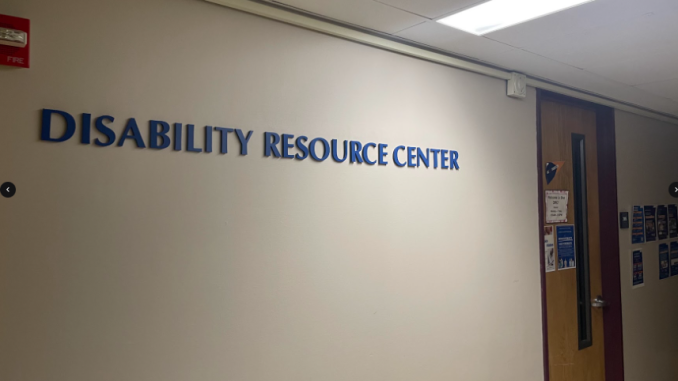
World Autism Acceptance Month is celebrated every April. SUNY New Paltz’s Disability Resource Center (DRC) has been and will continue to host events throughout the month.
The DRC hosted a disability art show that ran from April 2 to April 9. This year’s theme was disability identity and how it impacts one’s sense of self. Artwork from various students were displayed throughout the Fine Arts Building rotunda.
Emily DiSciullo is the Assistant Director for Learning Support & Neurodiversity Initiatives at the DRC. In this position DiSciullo organizes programs including one of SUNY New Paltz’s own foundations which is both founded and funded by alum Myra Kressner.
The Kressner Family Autism Spectrum Program Fund allows the DRC to provide students with the tools they may need throughout their college experience. The fund provides educational support, as well as functional skill development, which are specifically geared toward students with learning disabilities who are registered with the DRC.
DiSciullo said, “Kressner decided to start this fund due to her personal experiences with her daughter who is on the autism spectrum. There wasn’t adequate support for her as she navigated her educational career. Kressner felt that she wanted to give back as an alumnus to better support students on the spectrum and be successful in college and post-college.”
DiSciullo spoke on recent updates with the fund. “There’s going to be a big push through the Foundation Office to promote more awareness about the program and about what we do as part of Autism Acceptance Month as well. That’s something that I think is going to be coming out for the Office of Communication and Marketing (OCM) and also for the foundation itself this month.”
Additionally, DiSciullo said the DRC has gained traction with the help of more funding. “We recently were able to create a DRC scholarship for students through another couple who donated to start a scholarship fund for the DRC”
In 2008, April 2 was officially deemed World Autism Acceptance Day following a unanimous decision made by the United Nations General Assembly. This year marks its 17th year as a government-recognized day.
In 1970, April was initially deemed Autism Awareness Month by Bernard Rimland, Ph.D, a psychologist and autism researcher. After controversy sparked over the use of the term “awareness,” in 2020, the month became one of acceptance – a phrase that is more inclusive of what autistic individuals and advocates are striving for.
DiSciullo remarked upon the change in terminology. “Awareness is great and it’s important – but understanding that acceptance is really what folks are striving for – to help promote a more inclusive society and to accept neurodiversity as part of diversity, rather than just simply having an awareness of what it is; just taking it to that next step of really fostering an environment of acceptance.”
On April 2, Health Commissioner of the New York State Department of Health Dr. James McDonald released a statement regarding acceptance versus awareness. “While awareness reflects the need to educate the public about autism, acceptance goes a step further to embrace the autistic community as they are, with all of their strengths and challenges,” said McDonald.
Christopher Banks, the president and CEO of The Autism Society of America states that “awareness is knowing that somebody has autism. Acceptance is when you include [a person with autism] in your activities. Help [them] to develop in that community and get that sense of connection to other people.”
The Organization for Autism Research (OAR) is an organization based in Arlington, VA. Their issue of “the OARacle” published on Feb. 1, navigates the goals to strive for during Autism Acceptance Month. They list the goals as follows: “Goal 1: Support the autism community with information autistics, families, educators, professionals. Goal 2: Teach students in general education about autism using the Kit for Kids program. Goal 3: Support autistic young adults through OAR’s Hire Autism initiative. Goal 4: Raise money for OAR’s programs, resources, and new research. Goal 5: Fundraise for OAR’s mission in a new and exciting platform: Stream for Autism.”
The College Autism Network (CAN) is a nonprofit organization based in Tallahassee, FL. CAN allows autistic students to navigate higher education, providing resources to improve their experience and outcome. Through their website, CAN presents updates in research, advocacy and summit and training opportunities to get involved with the organization.
An act was introduced in Congress on Feb. 1, 2024 “to amend the Public Health Service Act to enhance activities of the National Institutes of Health with respect to research on autism spectrum disorder and enhance programs relating to autism/reauthorize certain programs with respect to autism spectrum disorder, and for other purposes.”
Throughout the month of April, the DRC will be hosting a variety of events in honor of autism acceptance. On Wednesday April 10, the DRC hosted an “Art Therapy: Neurodiversity Self-Portraits” event at 12:30 p.m. in Haggerty Administration Building (HAB) 204. On Friday April 12, an “Exploring Writing: Disability Narratives” workshop will be hosted at 3:30 p.m. in HAB 203.
The following Wednesday April 17 will be the Faculty Development Center’s Tea with the DRC at 2 p.m. in College Hall (CH) 113. On Sunday April 21 the DRC is hosting a Sensory-Friendly Concert at Studley Theatre beginning at 2 p.m. At the Student Union Building on Tuesday April 23 the “Neuro-Inclusive Friendly Event” begins at 5 p.m. in room 409. To wrap up Autism Acceptance Month, the DRC will be taking a field trip to the Dorsky Museum on Wed April 24.
The Autism Society of America is accepting donations through their “#CelebrateDifferences” campaign at https://autismsociety.org/autism-acceptance-month/
More information on SUNY New Paltz’s Disability Resource Center can be found on their website, https://www.newpaltz.edu/drc/ or on their Instagram, @newpaltz_drc.
